Gender
To wives who leave their husbands at home…
Remember his "household helplessness."See the recent post "How to live without a woman" for another example from the 1930s of male household helplessness (aka strategic incompetence).
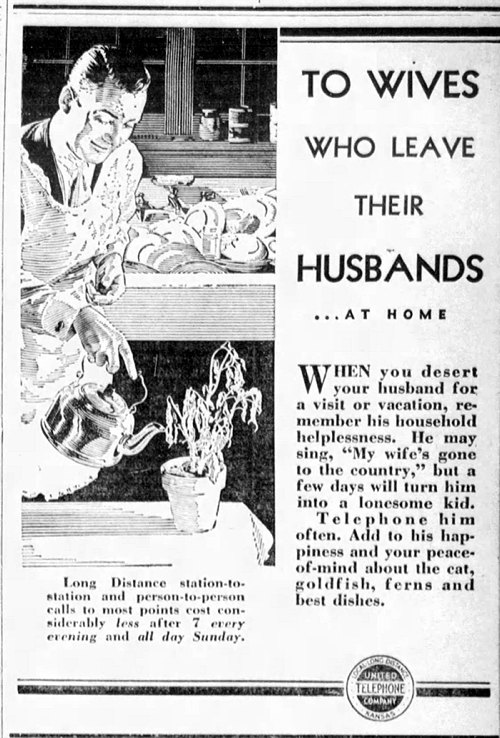
Marysville Advocate - Aug 6, 1936
Posted By: Alex - Wed Feb 15, 2023 -
Comments (2)
Category: Advertising, Gender, Men, 1930s
How to live without a woman
Alexander Wright's 1937 book, How To Live Without A Woman, was a celebration of bachelorhood. But it seems that Wright's strategy for life without a woman was to get his female friends to feel sorry for him and do his housework for him.Doesn't really seem like he was living without a woman if he was still getting women to do all his work. And you have to wonder how long he managed to keep any female friends before they figured out what was going on.
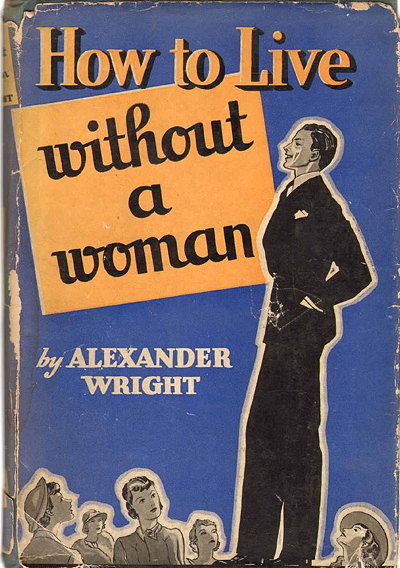
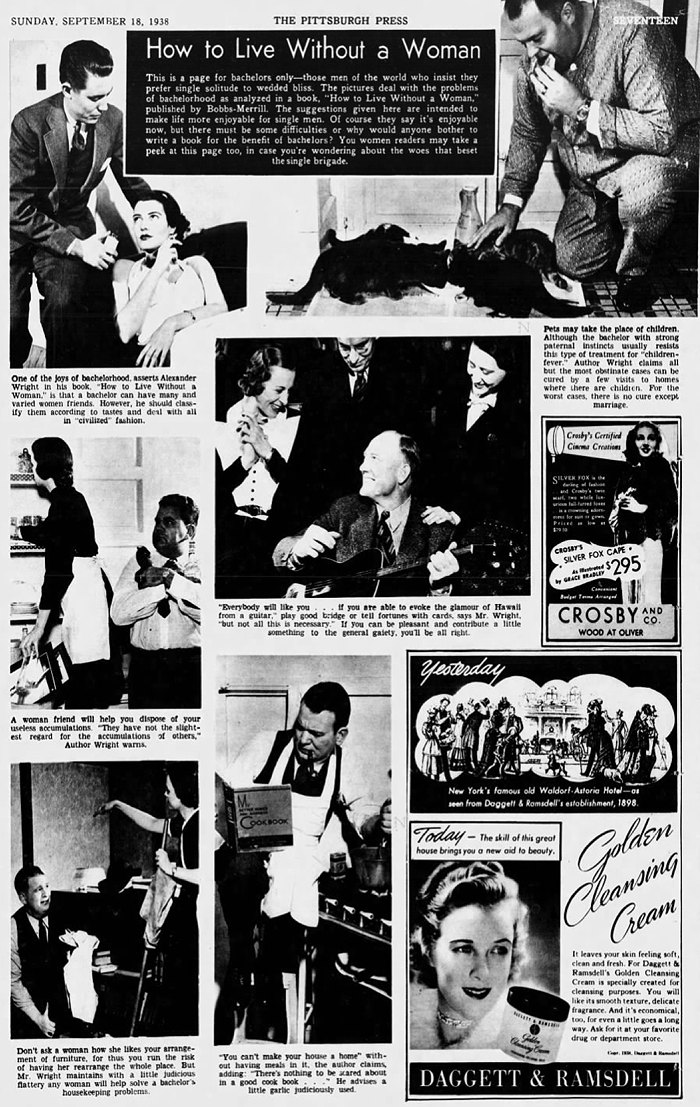
Pittsburgh Press - Sep 18, 1938
Posted By: Alex - Tue Jan 31, 2023 -
Comments (2)
Category: Gender, Men, Women, Books, 1930s
To Gladden Hearts and Lighten Labor
Surprise, Honey! Now get to work.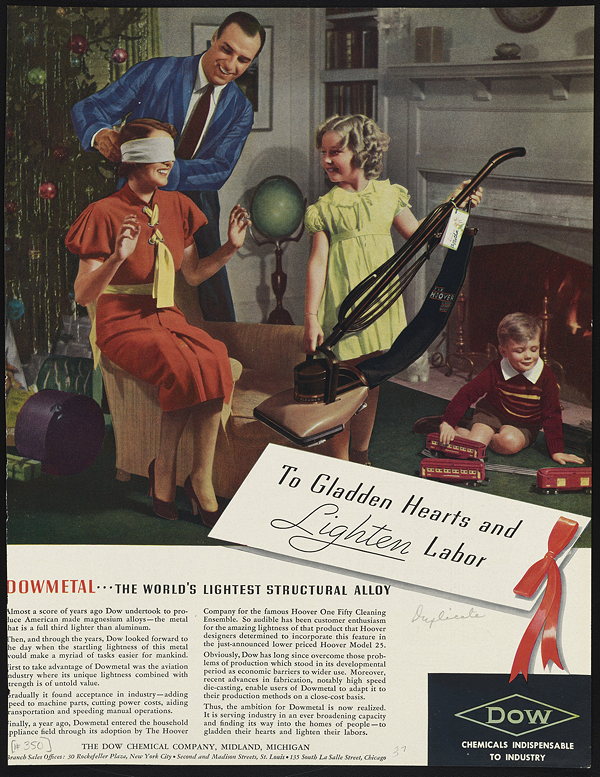
1937 - via Science History Institute
Posted By: Alex - Sat Dec 25, 2021 -
Comments (4)
Category: Advertising, Gender, 1930s, Christmas
Inmate seeks transfer
Specifically, he wanted to be transferred to a woman's prison so that he could "be fruitful and multiply and replenish the earth."He must have figured it didn't hurt to ask.

Miami News - Nov 10, 1971
Posted By: Alex - Sat Nov 06, 2021 -
Comments (0)
Category: Prisons, Gender, 1970s
No dates for speeders
If Aristophanes's Lysistrata was rewritten to be set in Memphis during the 1930s, it could be about all the young women banding together to refuse to date any boys who drove faster than the speed limit.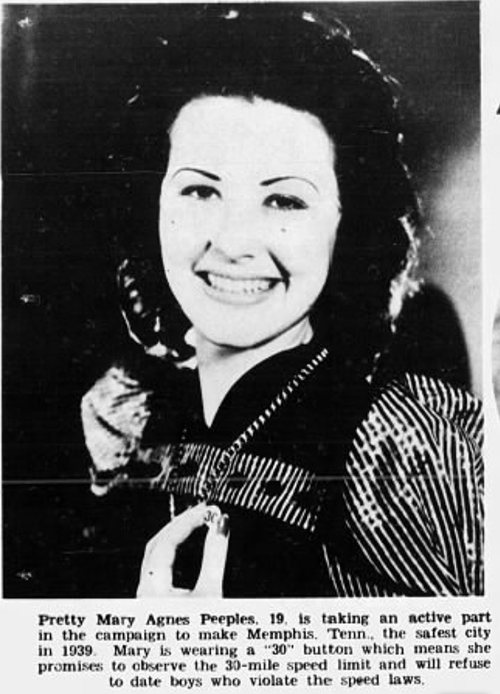
Pittsburgh Press - Feb 26, 1939
A better quality picture of Mary Agnes:
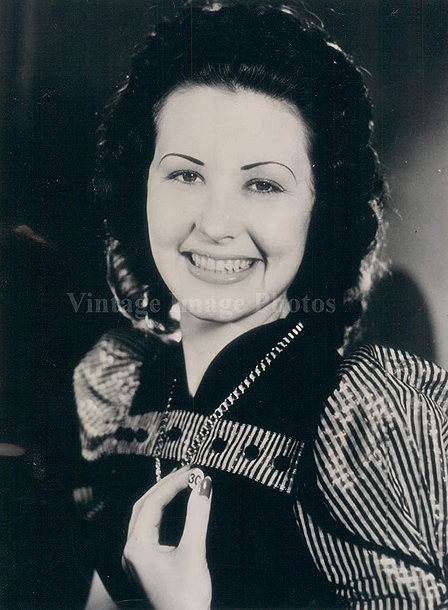
Posted By: Alex - Sat Oct 09, 2021 -
Comments (2)
Category: Gender, 1930s, Cars
Doll-to-Doll Carpeting, and other Mr Leggs Ads
These Mr. Leggs ads offer a window onto the twisted male psyche of the 1960s. They ran in newspapers and magazines (Esquire) from 1963 to 1965.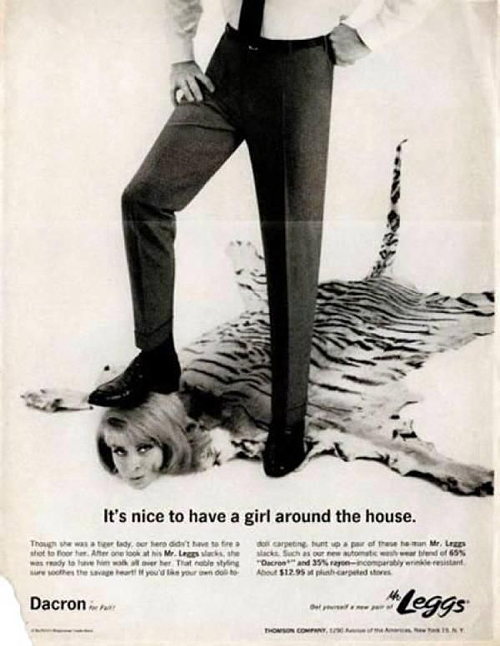
"Though she was a tiger lady, our hero didn’t have to fire a shot to floor her. After one look at his Mr. Leggs slacks, she was ready to have him walk all over her. That noble styling sure soothes the savage heart! If you’d like your own doll-to-doll carpeting, hunt up a pair of these he-man Mr. Leggs slacks."
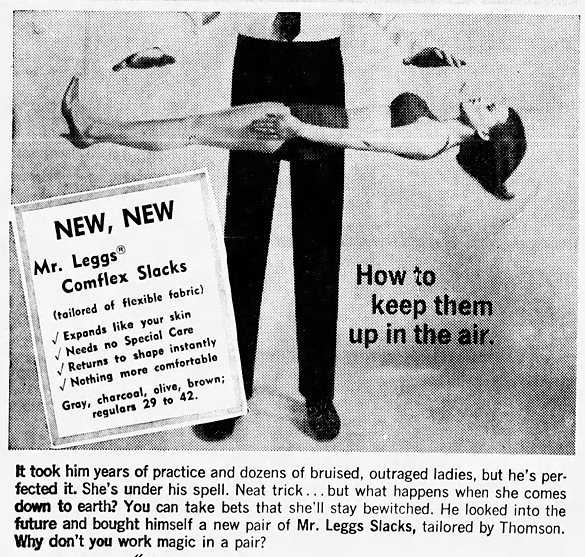
"It took him years of practice and dozens of bruised, outraged ladies, but he's perfected it. She's under his spell."
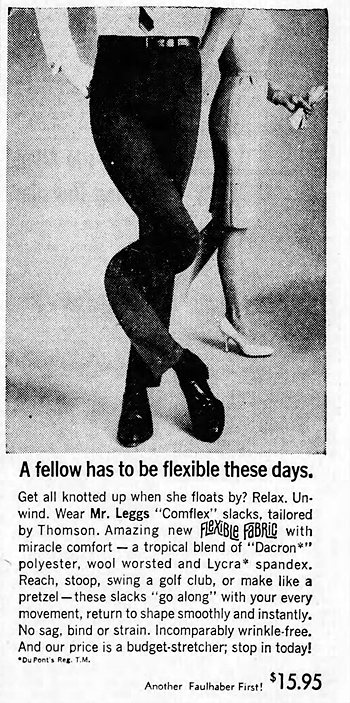
"Get all knotted up when she floats by? Relax."
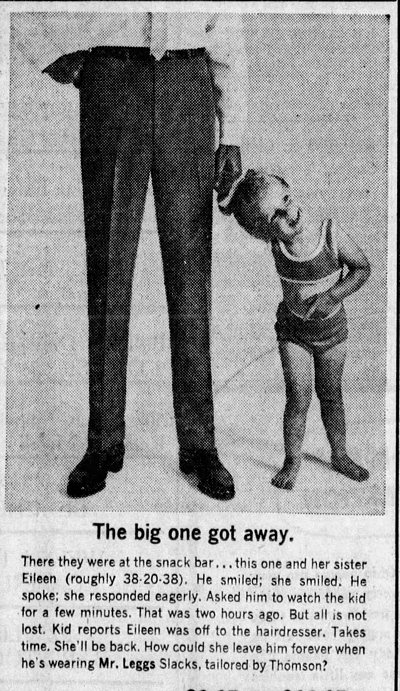
"There they were at the snack bar... this one and her sister Eileen (roughly 38-20-38). He smiles; she smiles. He spoke; she responded eagerly. Asked him to watch the kid for a few minutes. That was two hours ago."
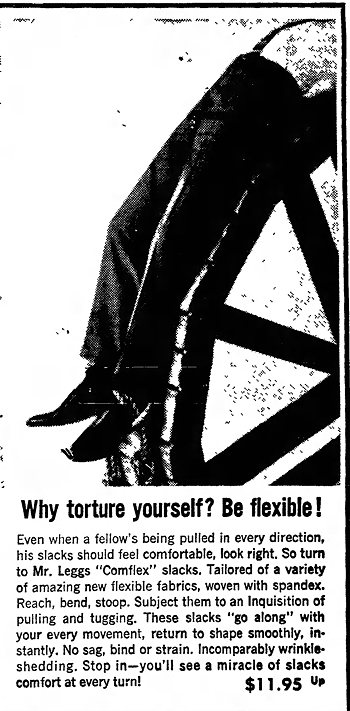
"Why torture yourself? Be flexible!"
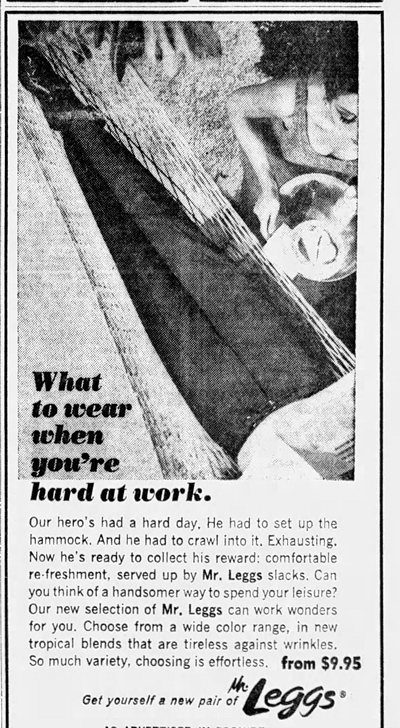
"Our hero's had a hard day. He had to set up the hammock. And he had to crawl into it. Exhausting. Now he's ready to collect his reward."
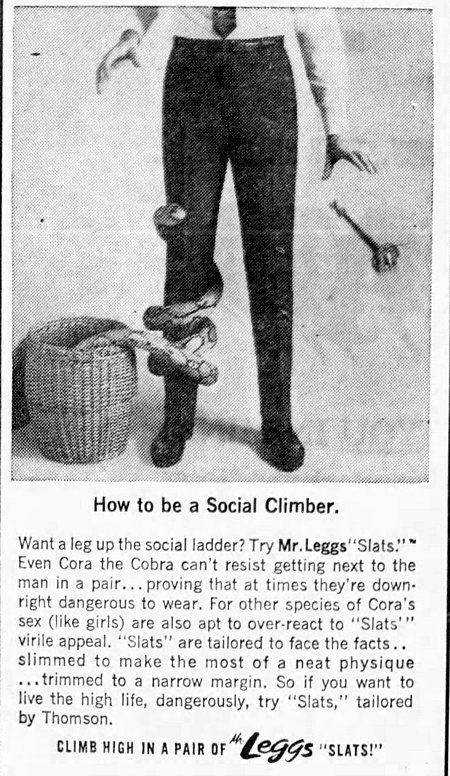
"Even Cora the Cobra can't resist getting next to the man in a pair... proving that at times they're downright dangerous to wear. For other species of Cora's sex (like girls) are also apt to over-react to Slats' virile appeal."
Posted By: Alex - Sat Jul 10, 2021 -
Comments (3)
Category: Advertising, Gender, Men, 1960s
Dodge La Femme
1955: Chrysler introduced the Dodge La Femme, a two-door, pink-and-white sedan "for the discriminating modern woman".
source: DodgeLaFemme.com
In an attempt to make the car irresistible to women, Dodge also threw in a pink leather handbag that contained "cigarette lighter and case, compact, lipstick and other feminine items covered in matching pink leather." Plus, "a vinyl raincoat and stylish sou'wester hat, printed in the same pink shade and pattern as the Jacquard upholstery." And a matching pink umbrella!
But even with all this, the car failed to appeal to consumers. However, because fewer than 2500 of them were ever made, the car is now sought after by collectors.
More info: wikipedia
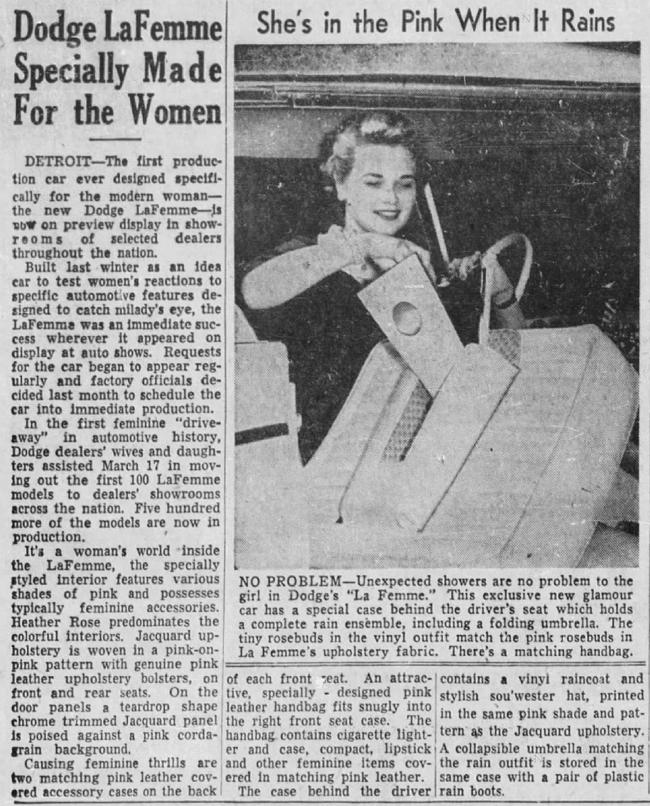
St. Louis Post-Dispatch - Apr 10, 1955
Posted By: Alex - Sat Apr 03, 2021 -
Comments (3)
Category: Gender, Women, 1950s, Cars
Merry Christmas 2020!
Otherwise known as "Santa Claus's Mistake."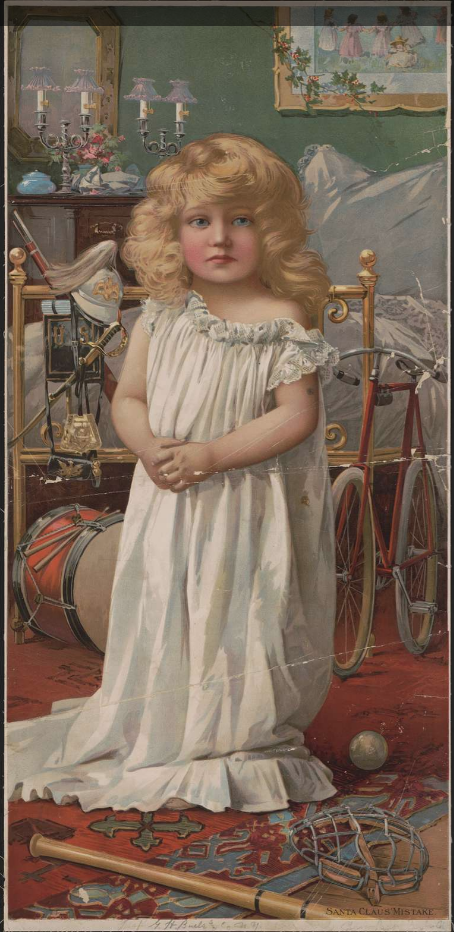
Posted By: Paul - Fri Dec 25, 2020 -
Comments (8)
Category: Holidays, Toys, Gender, Goofs and Screw-ups
The Navassars Ladies Band
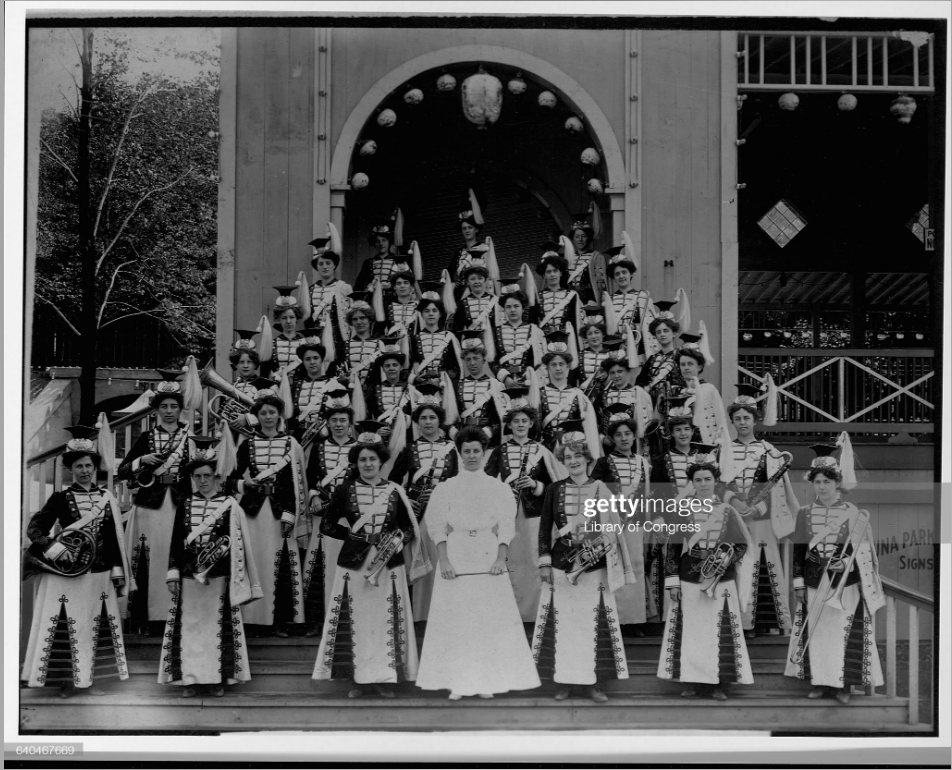
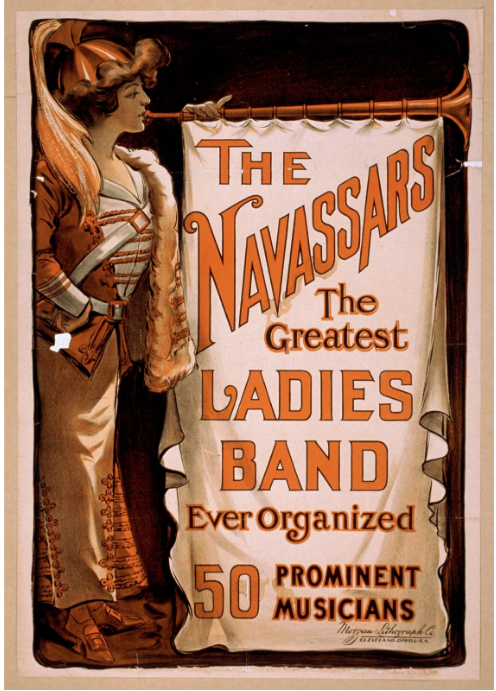
Posted By: Paul - Sat Dec 12, 2020 -
Comments (5)
Category: Music, Gender, Women, Nineteenth Century
Of course, unmarried girls can use them!

Davenport Quad-City Times - June 14, 1959
Posted By: Alex - Sun Jul 26, 2020 -
Comments (2)
Category: Advertising, Gender, Body Fluids, 1950s

| Who We Are |
|---|
| Alex Boese Alex is the creator and curator of the Museum of Hoaxes. He's also the author of various weird, non-fiction, science-themed books such as Elephants on Acid and Psychedelic Apes. Paul Di Filippo Paul has been paid to put weird ideas into fictional form for over thirty years, in his career as a noted science fiction writer. He has recently begun blogging on many curious topics with three fellow writers at The Inferior 4+1. Contact Us |




